|
Other Wintons
Winton, East Lothian, Scotland
About fifteen miles from Edinburgh, in a setting
that is not unlike the countryside surrounding Bournemouth, this
ancient estate is the one from which our Winton directly or indirectly
gets its name. The Winton in East Lothian, and more probably the
Earl of Winton, is part of the Scottish heritage of the philanthropic
land-owning Talbot sisters who played a big role in the development
of the north Bournemouth area.
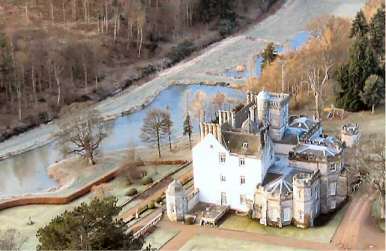 Over
nearly a thousand years, Winton has had an up and down history.
It was built in 1150 and about four hundred years later Henry
VIII had it burnt down in an effort to impress Mary Queen of Scots! Over
nearly a thousand years, Winton has had an up and down history.
It was built in 1150 and about four hundred years later Henry
VIII had it burnt down in an effort to impress Mary Queen of Scots!
The title of Earl of Winton was created in 1600.
Support for the Royal Stuarts in the Jacobite uprising of 1715
saw the capture of George, the 5th Earl of Winton, at the Battle
of Preston. He was taken to the Tower of London and his land and
titles including the Winton estate were confiscated. The title
disappeared for nearly 150 years.
Bonnie Prince Charlie requisitioned Winton House
for use during the 1745 uprising. The rebel army camped on the
estate and were fed by the local people.
Winton experienced several more changes of hands
and is now owned by the Ogilvy family. The estate
continues to operate and the house itself is used for conferences
and other corporate events.
Nearby is the village of New Winton which largely
consists of two hundred year old terraced cottages built around
three sides of large village green.
The village is a conservation area and the cottages
are listed. New Winton was served by a railway until 1960 when
the line and station were closed.

New Winton. Photo © Richard
Webb |
Winton, Ardrossan, Scotland
 The
Winton name is very prominent in the Ayrshire town of Ardrossan
where it appears in a number of roads, streets and buildings.
Among them are Winton Street, Winton, Lane, Winton Court and Winton
Circus The now closed Winton pier used to be a ferry gateway to
the Isle of Arran. The
Winton name is very prominent in the Ayrshire town of Ardrossan
where it appears in a number of roads, streets and buildings.
Among them are Winton Street, Winton, Lane, Winton Court and Winton
Circus The now closed Winton pier used to be a ferry gateway to
the Isle of Arran.
The local football team is even called Winton Rovers!
A local highlight every June is the Highland Games.
If you are lucky you'll also get to hear the Ardrossan Winton
Flute Band. Click
here to see video of them.
What's the Winton link? Without getting into the
complexities of Scottish clans, territories, chieftains and local
land ownership it is all to do with reflecting the name of the
Earl of Winton. And he is the same chap that the Talbot sisters
probably named our Bournemouth Winton after.
Winton, Queensland, Australia
Winton is a small town in the Queensland outback
. It has a population of about 1600 and the main occupations are
to do with sheep, cattle and tourism.
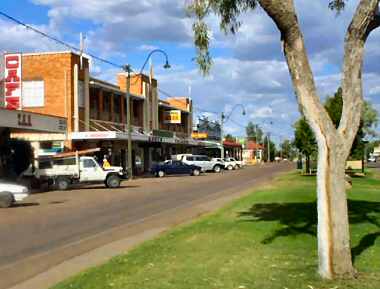 Its
first postmaster was Robert Allen who moved there in 1875 after
leaving the Queensland police. The place was originally called
Pelican Water Hole or Wallace's Camp. Allen thought both names
were a bit wordy to write on envelopes and renamed the place after
his home town. Its
first postmaster was Robert Allen who moved there in 1875 after
leaving the Queensland police. The place was originally called
Pelican Water Hole or Wallace's Camp. Allen thought both names
were a bit wordy to write on envelopes and renamed the place after
his home town.
For more than a hundred years it was believed to
be Winton, Dorset. Research carried out by our Web Editor has
now revealed that Allen actually came from near Winchester - which
was frequently known as Winton.
Allen's store and hotel are no longer standing.
Their site is now occupied by a branch of the National Bank.
The town has a couple of claims to fame. It is where
QANTAS, the Australian national airline was founded. On 16 November
1920 the Queensland and Northern Territory Air Service was registered
as a company with its headquarters in the town. The first official
meeting of Qantas took place at the Winton Club on 10 February
1921. The Club still stands, and is open to visitors.
Winton is also the birthplace of "Walzing Matilda",
the unofficial Australian national anthem. The song was written
there and first performed at Winton's North Gregory Hotel in 1895.
The area around the town is rich in dinosaur fossils,
and about fifty miles to the southwest is fossil evidence of a
dinosaur stampede.
Every two years Winton holds an Outback Festival
including the Australian Dunny Derby, Bushman's Egg Throwing,
Outback Goanna Pulling Championship, Whip Cracking Championship,
Outback Ute Muster, Broom Throwing, Wool Bale Rolling, and Outback
Iron Man and Iron Woman. Dunny is the colloquial Australian word
for "toilet" and the Dunny Derby involves Outback outdoor
toilets on wheels pulled by teams of four while the "jockey"
sits in the normal position.
Winton's climate is a little warmer than that of
its Dorset counterpart. The temperature can rise to a scorching
45°C in January! Maybe that is why they have one of Australia's
two remaining open-air cinemas.
Winton, Victoria, Australia
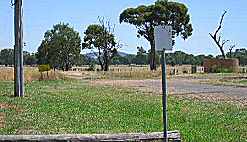 This
town dates back to 1857 but has slowly declined over the last
fifty years. This
town dates back to 1857 but has slowly declined over the last
fifty years.
In a familiar pattern, the railway station closed
in 1959, the post office closed a year later and in 1987 the place
was by-passed by the Hume Freeway.
All that is left of the town now are a few houses,
a primary school, a County Fire Authority shed, a derelict roadhouse
and the cemetery.
Nearby swamps were turned into the artificial Lake
Mokoan in the early 1970's. It proved to be an inefficient reservoir
because of evaporation and is now scheduled to be returned to
natural wetlands.
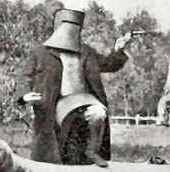 For
the past 40 years however, Winton has become home to a motor racing
circuit. For
the past 40 years however, Winton has become home to a motor racing
circuit.
Regular meetings feature the snarling engines of
everything from supercars to trucks.
Winton is also bang in the middle of Ned Kelly territory
and in 1878 reputedly played its part in the creation of the Iron
Man's legend.
A police constable apparently got drunk in the Winton
Grog House before allegedly assaulting Ned's mother and sister,
thus triggering gunshots and the Kelly gang's rampage across Victoria.
Winton, New South Wales, Australia
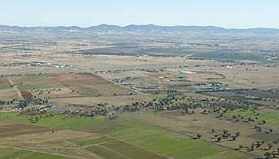 This
Winton is a tiny village half way between the New South Wales
town of Tamworth and the Melville Range nature reserve. The area
is one of sheep and cattle stations. It has hot summers and mild
winters but can suffer periods of drought, violent thunderstorms,
heavy rain and flooding. This
Winton is a tiny village half way between the New South Wales
town of Tamworth and the Melville Range nature reserve. The area
is one of sheep and cattle stations. It has hot summers and mild
winters but can suffer periods of drought, violent thunderstorms,
heavy rain and flooding.
The nearby nature reserve supports a huge range
of wild life including kangaroos, wallabies, tree frogs, scores
of bird species, snakes, skinks, geckoes, dubious detellas and
bandy-bandies.
Not absolutely sure what a dubious detella or a
bandy-bandy is - but its probably best not to step on one.
Tamworth has its own brand of wildlife. It is Australia's
country music capital and hosts an annual festival featuring hundreds
of country and western singers and bands.
People come from all over Australia for the January
event. Many camp out in the open - which can be unfortunate since
the festival coincides with the heavy rain and flooding season.
Winton, North Carolina, USA
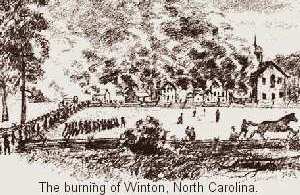 This
Winton is in northeast North Carolina about 15 miles from neighbouring
Virginia. This
Winton is in northeast North Carolina about 15 miles from neighbouring
Virginia.
It has a population of around 1000 and was once
home to the Meherrin, Chowanoke and Tuscarora Indian tribes. It
was established as a town in the mid 18th century and is one of
North Carolina's earliest settlements.
Its main claim to fame is that it was the first
town to be burned to the ground in the American Civil War. In
1862, union gun boats sailed up the River Chowan and began a bombardment.
Finding the town undefended, union troops then looted
and set it on fire.
The town was subsequently rebuilt and produced a
number of prominent American politicians. It was also the home
of Richard Gatling - the man who invented the world's first machine
gun.
Winton, California, USA
This Winton was founded around 1912, has a population
of around 9,000 and is in Merced County about half way between
San Francisco and the Yosemite National Park.
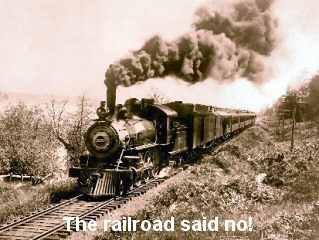 It
is not a particularly prosperous place, the most recent census
shows more than a quarter of the population living below the poverty
line. It
is not a particularly prosperous place, the most recent census
shows more than a quarter of the population living below the poverty
line.
The community is a largely rural and agricultural.
The ethnic mix is 81% Hispanic; 10% White; 7% Asian; 1% Black.
Winton got its name as an economy measure. It was
first called "Winfield"; but the Santa Fe railroad had
a "Winfield" on one of their lines in Arizona and refused
to stand for another in California.
In the interests of economy local officials sought
a substitute that would involve the minimum of painting out on
existing signs, they changed the last syllable and made it Winton.
Another version of the story says that Winton was
named after then then Merced County surveyor.
The town suffered some years ago from the closure
of the nearby Castle Air Base. It has now been reopened as a museum
containing a large collection of US military aircraft.
Winton is a cheap if you drive a car. Petrol prices
average at about £1.38 a gallon!
Winton, New Zealand
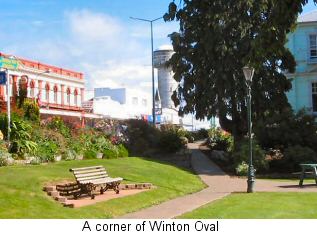 This
Winton is a small farming town at the southern end of New Zealand's
South Island about 15 miles from Invercargill. It was established
in the 1870's and named after a well-known local stockman called
Thomas Winton. This
Winton is a small farming town at the southern end of New Zealand's
South Island about 15 miles from Invercargill. It was established
in the 1870's and named after a well-known local stockman called
Thomas Winton.
The climate is pleasantly temperate with summer
temperatures rising to around 25 degrees.
The town is centred one main street and grew around
a railway service that was finally closed in the 1980's.
Winton is congratulated constantly on its lovely
gardens which feature a great show of perennial flowers and shrubs.
Like our Winton it has a large green open space which is known
as the Winton Oval.
The Oval is surrounded by trees and has an Anzac
memorial rotunda at its centre.
Some of the scenes in the Anthony Hopkin's film
"The World's Fastest Indian" were shot in the centre
of Winton.
Winton achieved notoriety as home to the only woman
ever hanged in New Zealand. Minnie Dean was found guilty of child
murder in 1895. She is buried in Winton cemetery.
Winton, Minnesota, USA
This Winton is set amid the lakes and pine forests
of a wilderness that stretches into Canada. It has a population
of 189 and is located in the heart of the Superior National Forest
in St. Louis County about nine miles from the Canadian border.
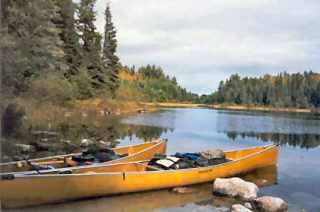 The
territory was the home of the Ojibwa Indian tribe. Its economy was built on the fur trade, iron ore mining and logging. The
territory was the home of the Ojibwa Indian tribe. Its economy was built on the fur trade, iron ore mining and logging.
To the west is Lake Superior and the town is surrounded
by forests which are home to moose, deer, timberwolves, bald eagles
and black bears. Not far away is an International Wolf Centre
dedicated to the study and preservation of wolves.
Among many tourist activities are camping, boating,
fishing, swimming, hiking, backpacking and biking in summer and
cross-country and downhill skiing, snowmobiling, snowshoeing,
ice fishing, skating, and sledding during a winter season which
is marked my heavy snow and temperatures that can fall to -50°C.
Established in the 1880s, this Winton was first
called Knox's Landing after Samuel Knox whose lumber company operated
in the area. It became Winton in 1887 when Knox renamed the town
as a wedding gift to his granddaughter who married a fellow lumber
baron named William Winton. Winton supervised the building the
first sawmill at Winton in 1898 and was a very wealthy man who,
along with many other entrepreneurs of the day, logged the white
pine forests of the area nearly into extinction.
At the time of the lumber boom just over a hundred
years ago the population was around 2000 and there were hotels,
stores, saloons, boarding houses, a blacksmith and livery stable,
community hall, post office, school, and hospital. The labour
force was composed largely of immigrants from Finland and Slovenia.
Winton today is a very small village, but while
the lumber mills that put it on the map over 100 years ago are
gone, the spirit of the logger remains. It is very popular summer
destination for canoeists and fisherman from throughout the United
States.
Winton, Wyoming, USA
 Time
to heave on your buckskins, saddle up, hit the trail and ride
out into the desert. Sweetwater County to be precise. Time
to heave on your buckskins, saddle up, hit the trail and ride
out into the desert. Sweetwater County to be precise.
But don't expect much of a welcome cept from the
coyotes. This Winton is a piece of the Wild West that's gotten
wilder than it used to be. It's now a ghost town!
Once a small mining town of several hundred people,
it finally died around half a century ago.
At one time it had a Union Pacific store, a boarding
house, a pool hall, doctor's surgery, elementary school, post
office, bath house, a mine office and several hundred homes -
mostly for the families of the men who worked the six mines in
the neighbourhood.
Nothing much there now but dust and a kinda eerie
feeling. Just to get your bearings, it is about 200 miles west
of Laramie and 260 to Cheyenne. Nearest town is Rock Springs.
Winton, Northern Cape, South Africa
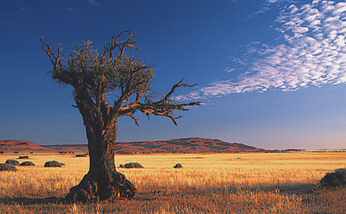 A
small place in Northern Cape Province and the dry savannah on
the eastern edge of the Kalahari desert, this Winton is actually
a large cattle farm still run by the Van Zyls - the same Afrikaans
family that settled there at the beginning of the last century. A
small place in Northern Cape Province and the dry savannah on
the eastern edge of the Kalahari desert, this Winton is actually
a large cattle farm still run by the Van Zyls - the same Afrikaans
family that settled there at the beginning of the last century.
From the first steps of finding water, building
a house and fences, the the farm grew in importance. Farmer Van
Zyl built a schoolhouse where he also taught the local children.
A post office, shop and petrol station followed.
Winton is a significant landmark in the Eastern
Kalahari. Although the school house has gone and there is no longer
a fully operating shop and post office anymore, Winton is still
the most common place for the local farmers to gather for social
meetings, prayer evenings, and so on. It is also the home
of the Winton Farmers Association. Once a month there is a big
auction of live stock on Winton, which most farmers attend to
buy and sell their live stock, and then enjoy a chat and a drink
together afterwards.
The weather conditions are extremely hot in summer
and rather cold in winter. Whilst still operating the farm, the
third generation of the Van Zyl family also run a guest
house. Their visitors are mainly people from the cities who
want the ultimate "get away from it all" experience.
Within a few hours drive are the Witsand nature
reserve and Kglagadi Transfrontier Park. Reddish sand dunes are
typical of the Kalahari - but at Witsand they are white and actually
make a noise! When it’s warm and dry, the sand groans, hums
and roars when disturbed. Technically it is caused by air moving
between sand molecules, and can produce a very unnerving effect.
Winton Washington, USA
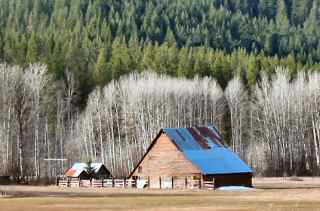 Originally
in the home territory of several Indian tribes, this Winton is
in Washington - not the capital, but the rugged mountainous state
in the Pacific North West of the United States, next to the Canadian
border. Originally
in the home territory of several Indian tribes, this Winton is
in Washington - not the capital, but the rugged mountainous state
in the Pacific North West of the United States, next to the Canadian
border.
It's a tiny place buried in the Chiwaukum Mountains
- part of the mighty Cascade mountain range and a couple of hours
drive from Seattle. The population is tiny and the main occupations
are agriculture and lumber.
It sprang up in 1892 when the Great Northern Railway
was built - a small railroad town with a depot and mostly railroad
workers living there.
Around 1900 a one-room school was built at Winton.
It remained in use as part of the Cascade School District for
many years until it was closed in 2000. There's no longer a town
or depot of any kind. The sawmill closed down a year or so ago.
You need a good map of Chelan County to find Winton
approximately half way between Lake Wenatchee and Leavenworth.
To give you an idea of the place, right next to it is Deadhorse
Canyon. And there's a log cabin up there in case you get lost.
Read an account of life
in this Winton by one of the very few people living there.
Winton, Bahamas
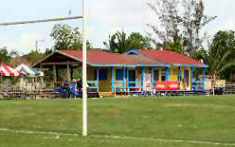 A
residential area a couple of miles from the centre of the Bahamas
capital of Nassau, this Winton is on the coast of New Providence
and faces North across the bay towards Athol Island and its coral
reefs. A
residential area a couple of miles from the centre of the Bahamas
capital of Nassau, this Winton is on the coast of New Providence
and faces North across the bay towards Athol Island and its coral
reefs.
The coast offers azure skies and sea, endless sand,
palm trees, and bronzed bodies.
Pretty much like Boscombe really.
Winton also has a very active rugby club. The ground
is pictured on the left.
Winton, Alabama, USA
 This
place is so small that even the people that live there don't notice
it. Best way to describe it is a cross roads on the way from Decatur
To Valhermoso Springs. This
place is so small that even the people that live there don't notice
it. Best way to describe it is a cross roads on the way from Decatur
To Valhermoso Springs.
It is in Morgan County to the south of the Tenessee
river and suffers the occasional tornado..
One thing for sure - it doesn't have a pub.
Morgan is a dry county where the sale of alcohol
is forbidden. Forbidden, that is, everywhere except in the county
town of Decatur. Wonder why they made the exception?
Winton Town, Tennessee, USA
Winton Town isn't really a town
at all. In fact its not even a village. One way to describe it
would be "a T-junction on the road from Viola to Hillsboro".
It sits in Coffee County amid fields and fairly dense woodland.
Recently it was the site of a big gettogether for members of the
Winton family. They not only brought their own food - they had
to bring their own chairs too.
 To
put the location of Winton Town in a slightly more familiar perspective,
it is around 70 miles from Nashville and 45 from Chatanooga. To
put the location of Winton Town in a slightly more familiar perspective,
it is around 70 miles from Nashville and 45 from Chatanooga.
Like the New South Wales Winton it is close to the
scene of a big music festival.
The annual Bonnaroo Music and Arts Festival takes
place in nearby Manchester and coincidentally in 2007 stars the
Police and Bournemouth lad Andy Summers.
Like the Californian Winton it is not far from a
big air force base.
The Arnold Centre is a major experimental site and
pioneered the testing of much of America's rocket and turbine
technology. It is the most advanced and largest complex of flight
simulation test facilities in the world and currently has more
than 50 aerodynamic and propulsion wind tunnels, rocket and turbine
engine test cells, and space environmental chambers.
Winton, Greater Manchester, England
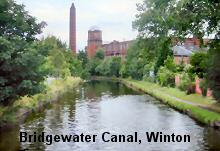 This
Winton is an urban area in the Eccles area of Salford. This
Winton is an urban area in the Eccles area of Salford.
It has a population of 12,000, suffers from severe
health deprivation and has several concentrations of child poverty.
Nearly 38% of the population lives in areas that
are considered to be among the 7% most deprived in England (approximately
4,200 people).
A little fewer than 88% live in areas that are considered
to be among the 30% most deprived in England.
It doesn't appear in the Doomsday Book, but Winton
is believed to be Saxon in origin. Its name derives from the Anglo
Saxon for "Windy village".
Winton, Cumbria, England
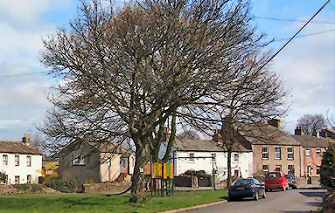 This
ancient village lies deep in the countryside just North of Kirkby
Stephen and about 20 miles East of the Lake District. This
ancient village lies deep in the countryside just North of Kirkby
Stephen and about 20 miles East of the Lake District.
Until local government reorganisation
in 1974, it was part of Westmorland.
Saxon in origin, the village is built along a road.
It has a small chapel but no church.
The village school was founded in 1659 and rebuilt
on the village green in 1826.
Winton's main feature is a stark and imposing three
storey manor house dating back to the beginning of the 18th century.
The building served as a boys school, and was reputedly not unlike
Charles Dickens' fearsome Dotheboys Hall where pupils were treated
like prisoners and not allowed home lest they reveal what the
school was like.
The village is overlooked by heather covered Winton
Fell and surrounded by a pattern of long narrow mediaeval fields.
The main industry is livestock and sheepdog trials are held there
every June.
Winton, North Yorkshire, England
This Winton is a hamlet in the parish of Kirby Sigston
about five miles from Northallerton in North Yorkshire.
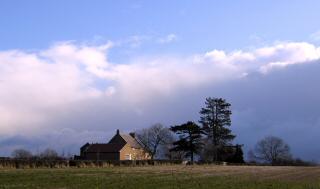 You'll
find it on the A 684 between Brompton and Ellerbeck. Set in rich
agricultural countryside, it consists of a few farms and houses
which are home to not more than one hundred people. You'll
find it on the A 684 between Brompton and Ellerbeck. Set in rich
agricultural countryside, it consists of a few farms and houses
which are home to not more than one hundred people.
Its only pub, the Wheatsheaf, was closed some fifty
years ago. It relatively recently acquired a manor house when
the former Stank Grange was renamed Winton Manor.
Winton has its own mystery - a lost village discovered
by archaeologists. The buildings are buried below the fields,
but nobody seems to know much more about them.
Like the Bournemouth Winton, this one is undergoing
some development. Strict planning regulations prevent the kind
of destruction taking place in Bournemouth, but a couple of farm
houses are being modernised and extended.
Finally, this settlement has a Winton Bank. It is
not like the junction of Alma and Wimborne roads. Its just a hillside
with a road running up it.
Winton, East Sussex, England
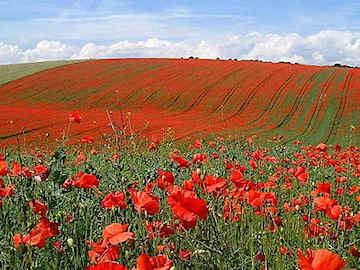 This
tiny hamlet is a handful of houses in a beautiful part of the
South Downs. Now normally known as Winton Street, it is officially
part of the nearby village of Alfreston. This
tiny hamlet is a handful of houses in a beautiful part of the
South Downs. Now normally known as Winton Street, it is officially
part of the nearby village of Alfreston.
What it lacks in size, Winton makes up for in history.
Its name alone has ancient origins - Tun (Farmstead) belonging
to Wiga (South Saxon Name).
It is the site of two Anglo-Saxon burial grounds.
Excavation revealed more than 150 graves dating back to around
the 5th century.
The graves contained a variety of objects including
amber, crystal, porcelain, glass and stone beads, bronze and silver
broches, rings, pins, tweezers, glassware, coins, parts of shields,
axe heads, swords, spearheads and knives.
Less than two miles away, cut in the chalk of a
hillside, is the famous Long Man of Wilmington. A similar distance
to the south is the Litlington White Horse - similarly cut in
the chalk.
More recent symbols have included a number of crop
circles.

Click here to see how some of these
Wintons spend their Christmas
|